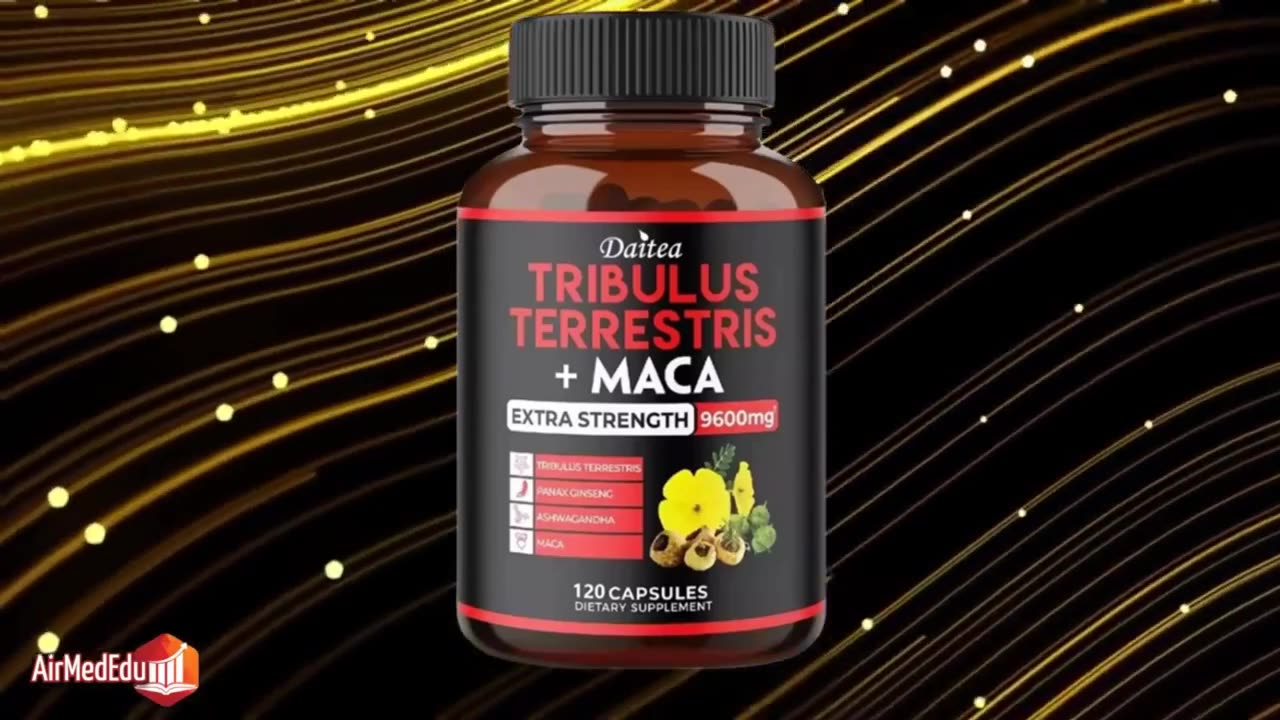Premium Only Content

Tribulus Terrestris with Maca Extract for Adult Health
In the search for natural options to optimize health in later life, herbal supplements have gained popularity, especially among people aged 40 to 65 and older who wish to maintain their vitality and well-being. Among these, the combination of Tribulus terrestris and maca extract, known as Lepidium meyenii, stands out for its traditional use and pharmacological potential.
Below, we explore the effects of this combination on health, focusing on its relevant biochemical processes and their impact on specific organs and systems, with a realistic approach based on recent scientific evidence. This provides a balanced view to empower informed decisions.
Tribulus terrestris, known as puncture vine or caltrop, is a plant of the Zygophyllaceae family used for centuries in Ayurvedic and Chinese medicine. Its active components, primarily steroidal saponins such as protodioscin, have been studied for their effects on sexual function and overall vitality. On the other hand, maca, an Andean root, is rich in macamides, glucosinolates, and essential amino acids and has been valued for its ability to improve energy, fertility, and hormonal balance. Together, these plants are frequently combined in supplements aimed at adults seeking to counteract the effects of aging, such as decreased libido, fatigue, or loss of muscle mass.
The pharmacological effect of Tribulus terrestris is primarily attributed to saponins, which modulate nitric oxide activity in the body. Nitric oxide is a key vasodilator that improves blood flow, which may influence erectile function and cardiovascular health. In animal studies, protodioscin has been shown to stimulate the release of luteinizing hormone (LH) from the pituitary gland, which in theory could increase testosterone synthesis in Leydig cells in the testes. However, human studies have not found a significant increase in testosterone levels, suggesting that the main benefit may be related to improved libido through non-hormonal mechanisms, possibly mediated by NO or psychological effects.
Maca, for its part, contains macamides, lipid compounds that act as neuromuscular modulators and antioxidants. These molecules can influence dopaminergic and serotonergic pathways in the nervous system, improving mood and energy. Furthermore, maca glucosinolates exhibit antioxidant properties, reducing oxidative stress by neutralizing reactive oxygen species (ROS). This may protect cells from age-related damage, such as chronic inflammation. The combination of both herbs could enhance these effects, although the exact mechanisms of their synergy still require further investigation.
In the cardiovascular system, Tribulus terrestris may contribute to vascular health by promoting vasodilation through increased nitric oxide, which improves circulation and lowers blood pressure in some cases. Preclinical studies suggest that its saponins may inhibit angiotensin-converting enzyme (ACE) activity in tissues, a mechanism similar to that of some antihypertensive medications. Maca, for its part, has been shown in human studies to reduce blood glucose and cholesterol levels, which supports cardiovascular health in people with type 2 diabetes. These effects are particularly relevant for older adults, who face a higher risk of cardiovascular disease.
In the endocrine system, maca may influence the hypothalamic-pituitary-gonadal axis, improving hormonal response without significantly altering testosterone or estrogen levels. In men and women aged 40 and older, this translates into increased sexual desire and a reduction in symptoms associated with late-onset hypogonadism or menopause, such as fatigue or mood swings. Tribulus terrestris complements this effect by improving the sensitivity of androgen receptors, which could amplify the perception of sexual well-being without measurable hormonal changes.
The reproductive system is one of the main beneficiaries. In men, Tribulus terrestris has been shown in clinical trials to improve erectile function and sexual satisfaction, with an increase of up to 2.7 points on the IIEF (International Index of Erectile Function) scale compared to placebo. In women, both Tribulus and maca have been shown to increase libido and reduce symptoms of sexual dysfunction, especially in postmenopausal women. In studies, maca improved sperm quality parameters, such as motility and concentration, in men with idiopathic infertility, although the results are not consistent in all cases. These effects likely derive from the combined action of saponins and macamides on circulation and neuronal function.
In the musculoskeletal system, Tribulus terrestris may support the maintenance of muscle mass by improving protein synthesis through the action of saponins. Although it has not been shown to significantly increase strength in healthy athletes, in older adults with early sarcopenia, it may contribute to physical vitality. Maca, with its energizing properties, reduces muscle fatigue, facilitating regular physical activity, a key factor for musculoskeletal health in this population.
The nervous system also benefits, particularly from the action of maca. Its macamides can modulate neurotransmitters such as dopamine, improving mood and mental energy. This is especially relevant for adults aged 40 to 65 who experience mild cognitive decline or chronic fatigue. Furthermore, the antioxidants in both plants may protect neurons from oxidative damage, a factor in brain aging.
In the immune system, maca glucosinolates and Tribulus terrestris saponins exhibit anti-inflammatory and antioxidant properties that could strengthen the immune response. Preclinical studies suggest that these herbs reduce inflammatory markers such as cytokines, which may be useful in counteracting chronic inflammation associated with aging. However, human evidence is limited and does not allow for a direct impact on immunity.
The renal system may indirectly benefit from the diuretic effects of Tribulus terrestris, which could help eliminate toxins and reduce the burden on the kidneys. Animal studies indicate that its extracts protect against cisplatin-induced renal toxicity, possibly by increasing antioxidant enzymes such as superoxide dismutase. However, rare cases of kidney damage have been reported with high doses or prolonged use, underscoring the need for caution.
The standard dosage of Tribulus terrestris ranges from 750 to 1500 mg daily, preferably standardized to contain 40–90% saponins, taken with meals to enhance absorption. For maca extract, 1.5–5 g of gelatinized powder or 500–1000 mg of extract is recommended daily, also with food. Combination supplements often include adjusted doses to optimize synergy, such as 975 mg of Tribulus (90% saponins) and 450 mg of maca per serving. It is crucial to follow the manufacturer's instructions and consult a physician before starting use, especially for those taking medications for hypertension, diabetes, or blood thinners, as Tribulus may interact with these drugs.
Although generally safe in the short term, these herbs are not without risks. The most common side effects include digestive discomfort such as nausea, diarrhea, or heartburn. In rare cases, prolonged use or high doses of Tribulus have been associated with liver or kidney damage, and its use is contraindicated in pregnant or breastfeeding women due to potential hormonal effects. Men with benign prostatic hyperplasia or prostate cancer should avoid it, as it may exacerbate these conditions. Maca is generally well tolerated, but it can cause alterations in hepatic transaminase levels at high doses.
The combination of Tribulus terrestris and maca extract offers promising benefits for adults aged 40 to 65 years and older, particularly in improving libido, erectile function, and sexual satisfaction, with effects on the reproductive, cardiovascular, endocrine, musculoskeletal, nervous, immune, and renal systems. These benefits derive from the action of saponins and macamides, which improve blood flow, reduce oxidative stress, and modulate neuronal activity. However, the scientific evidence is mixed, and the effects vary by individual.
It's important to emphasize that no supplement replaces a balanced diet rich in fruits, vegetables, lean proteins, and healthy fats, nor an active lifestyle that includes regular exercise and adequate sleep. These factors are the foundation for optimizing health in adulthood. For those considering incorporating Tribulus terrestris with maca, consultation with a physician or nutritionist is essential to ensure safety and effectiveness, adjusting the dosage to individual needs, and monitoring for potential interactions.
Before starting any supplement, consult your doctor to assess your health and receive personalized recommendations. Your well-being deserves informed decisions and a holistic approach to health.
-

xLuigi34x
6 hours ago100 Follower Special! Going to 100% The DKC Trilogy on stream!
36.1K2 -
 50:27
50:27
Sarah Westall
4 hours agoMusk Helps Expose the Most Consequential Political Blackmail Operation in Modern British History
15.3K10 -
 4:52:47
4:52:47
Due Dissidence
13 hours agoTrump GOES NUCLEAR on MTG, Tucker Exposes Butler COVERUP, Shmuley SUED For HILARIOUS Reason
30.2K14 -
 20:13
20:13
RealReaper
7 hours ago $1.36 earnedPredator Badlands: If You Like This Movie Then I Hate You
15.4K15 -
 LIVE
LIVE
GritsGG
6 hours ago#1 Most Warzone Wins 4000+!
256 watching -
 41:54
41:54
Nicholas Bowling
7 hours ago $1.51 earnedWhile Preaching to Muslims, EX-MUSLIM Shares Why He Left Islam (London, UK)
16.2K9 -
 2:25:28
2:25:28
bucketofish
4 hours agoNoise Floor \\ Behind the Mix - Ep 002 - Wide Awake by Katy Perry
23.1K1 -
 3:07:04
3:07:04
Biscotti-B23
4 hours ago $2.71 earned🔴 LIVE DISPATCH PLAYTHROUGH & PARTY GAMES
19.3K -
 LIVE
LIVE
Lofi Girl
2 years agoSynthwave Radio 🌌 - beats to chill/game to
105 watching -
 3:23:11
3:23:11
LumpyPotatoX2
6 hours agoHostile Takeover | High-Stakes PvP - #RumbleGaming
23K3